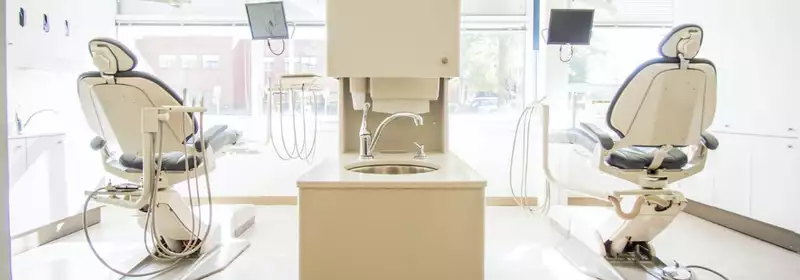A Dental Nurse supports the dentist in all aspects of a patient’s treatment and care.
They work alongside dentists, clinical dentists, technicians, and hygienists. It is their job to reassure patients, while providing direct support with the treatment itself.
If you are thinking about becoming a dental nurse, you’ll have to be responsible for looking after patient records, preparing instruments, making sure everything needed for the procedure is in place and responding quickly to the dentist’s requests to make sure everything goes according to plan.
Being a dental nurse is a varied and rewarding role that, like all good jobs, will bring its own unique challenges.
Much like a medical nurse, working as a dental nurse requires patience, compassion, and an eye for detail.
However, before you can practice, you need to make sure you’ve got the right qualifications.

Working as a Dental Nurse
In most instances, dental nurses work in either private dental clinics or in the dental department of hospitals. Some dental nurses work in the community, visiting patients who are unable to attend appointments for whatever reason.
This can require a fair amount of travel around your local area, but it is an important role that helps the vulnerable maintain good dental hygiene.
While most clinics operate traditional opening hours, you may be required to be on call, especially if you work in a hospital setting.
Although you’ll be working with a number of different patients, each with their own needs, your core responsibilities in dental nurse jobs will be the same. These will include:
- Preparing and passing instruments to the dentist or hygienist
- Suctioning water and saliva from the patient’s mouth during treatment
- Preparing fillings and other materials
- Providing support and reassurance to the patient
- Sterilising instruments
- Processing and filing x-rays
- Tidying and cleaning the dental surgery
- Recording and filing information about patients
- Advising patients on oral hygiene
- Carrying out stock control

Required Qualifications
Many dental nurses start off as a trainee dental nurse. You do not need any formal qualifications to be a trainee dental nurse, just be willing to learn and follow instructions carefully.
You can work as a trainee dental nurse indefinitely, however, there is a limit to the procedures you’re qualified to assist with. There’s also a limit to how much you can earn too.
In order to progress in your career, and your dental nurse salary, you will need to qualify as a dental nurse.
Currently, there are two ways you can qualify to become a dental nurse. The first is to gain your qualifications through either full-time or part-time study.
A level 3 apprenticeship in dental nursing allows you to gain a dental nursing qualification while working on the job. It will require you to carry out many of the duties of a dental nurse as you learn.
You will then have assignments to complete in the evening.
Alternatively, you can take a dental nurse course to gain a General Dental Council (GDC) approved qualification.
It’s important you make sure that your dental nurse course has this seal of approval otherwise you may find you’re not legally allowed to practice as a dental nurse.
Equally, any qualification issued by the NEBDN (National Examining Board for Dental Nurses) will carry considerable weight with any potential employers.
Each educational institution has its own entry requirements but generally speaking, you will need a minimum of two GCSEs at grade C (4) or above in English language and maths or a science subject.
Full-time degree level courses may require A Levels or equivalent level 3 qualifications.
But, again, check with your dental nurse course provider as these may vary.
Eligible dental nurse courses include:
- Foundation Degree in Dental Nursing
- Certificate of Higher Education in Dental Nursing
- National Diploma in Dental Nursing awarded by NEBDN
- Level 3 Diploma in Dental Nursing
These dental nurse courses can be studied either in a traditional setting or online. The big advantage of online study is you will be able to start straight away. You won’t need to wait until the term starts.
Whether you’re already a trainee dental nurse or starting from scratch this is a big advantage. It also means you can continue with your current role and study in your free time.
There are no classes to attend so you can just focus on getting the work done and gaining your dental nurse qualification.
It’s worth noting that some – not all – dental practices will want 1-2 years’ experience in addition to a dental nurse qualification so studying while you work is a good option. Your employer may even let you have some study time during the working week in order to help you get your dental nurse qualification faster.

Key skills
In addition to having the right qualifications and training to be a dental nurse, you also need to possess some key skills that will help them perform their day-to-day duties.
- Strong communication skills
- Computer literacy
- Ability to work well under pressure
- Ability to work well in a team
- Organisation and a methodical approach to work
- Confidence and a calm manner
- Ability to multitask
- Useful work experience
The ability to work as part of a close-knit team is essential. Some understanding of the science behind dentistry will also be a huge advantage.
Your dental nurse role will require you to interact with a range of different people so diplomacy and tact is a must-have skill. Especially as many of your patients will be anxious.
You must also be able to follow instructions quickly and precisely in order to support the patient through their procedure or treatment.
learndirect is one of the UK’s leading distance learning providers. Enrolling on our dental nurse courses provides you with instant access to your learning material so you can start studying right away. You will also have access to a dedicated tutor who will help you through the process. Check out our blog for useful tips on how to get the most out of your study experience.
Click below to enrol on our NEBDN certified and GDC approved, National Diploma in Dental Nursing. Places are limited so don’t delay.



















